
Tokyu Fudosan Holdings Group recognizes that the sustainability of communities and society is an important issue for the sustainable development of a company. Based on this awareness, the Group is investing in local communities through its business, such as improving resilience to disasters and promoting community coexistence, as well as engaging in various contribution activities such as increasing the value of the area and creating economic benefits. The Group will work with stakeholders such as design companies, construction companies, customers who use the facilities, and local governments to revitalize and develop local communities through its business.
Using our Group's business as a base, we will develop activities that will enhance the value of the local area through revitalization and development, and lead to enriched lifestyles for people.
To address local and social issues, the Group has established a Sustainability Committee, which reports directly to the President and CEO, and its subordinate organization, the Sustainability Council, which handles management across the Group.
Our accumulated history, achievements, strengths, and aspirations are being utilized in the large-scale development centered around Shibuya Station, described as a once-in-a-century project. Within the Tokyu Group, the area within a 2.5 km radius from Shibuya Station is defined as the 'Greater SHIBUYA' zone, and we are promoting town development as a comprehensive initiative. Enhancing the charm of 'Shibuya' in the broad sense, where people and culture flow smoothly. In our group, by the fiscal year 2024, we plan to complete and open four new projects, including 'Shibuya Sakura Stage,' and will continue to advance further initiatives. The Tokyu Fudosan Group has completed and opened projects such as Shibuya Sakura Stage, and will continue to promote further initiatives in the future.
In July 2021, we formulated the Shibuya town development strategy 'Greater SHIBUYA 2.0,' which evolved and deepened two visions: the 'Greater SHIBUYA Area Concept' by Tokyu Fudosan and the 'Entertainment City SHIBUYA' by Tokyu. In addition to strengthening the visions of both companies, we focus on the 'living' element, working towards the integration of 'work,' 'play,' and 'live,' and addressing the foundations of 'digital' and 'sustainable.' By doing so, we aim to create synergies and realize a 'Shibuya-style urban life' that can only be experienced in Shibuya.
The Tokyu Group is promoting community planning in Shibuya from the dual perspectives of urban development and initiatives to enhance the appeal of the area. Important projects for completing the development of urban infrastructure in the central area around Shibuya Station include “Shibuya Sakura Stage” and “SHIBUYA FUKURAS.” In addition to disaster prevention measures to enhance urban resilience, we are also supporting enhancements to the value of the Shibuya area by strengthening its functions as a transportation hub to ensure they are befitting of a large terminal station and developing a multi-layer pedestrian network to increase convenience, safety, and flow of foot traffic for pedestrians.
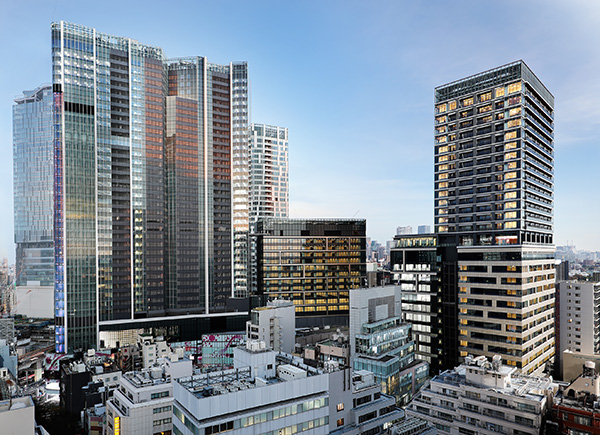
Non-fireproof buildings are clustered in the area of “Shibuya Sakura Stage” and these buildings have aged. Accordingly, we have conducted a major reorganization of the zones of this area in line with the shared use of small buildings, contributing to enhancing its disaster prevention qualities as a city, and achieving safe and secure community planning.
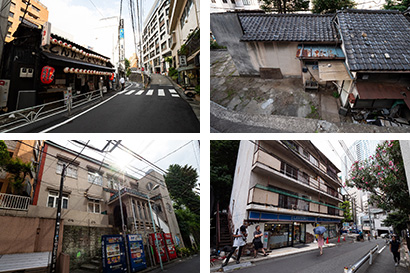
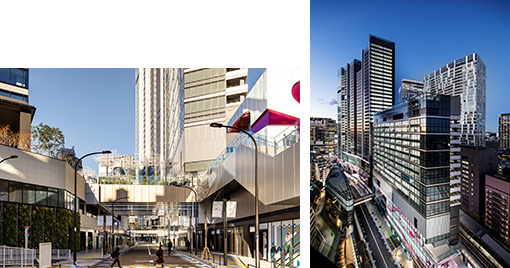
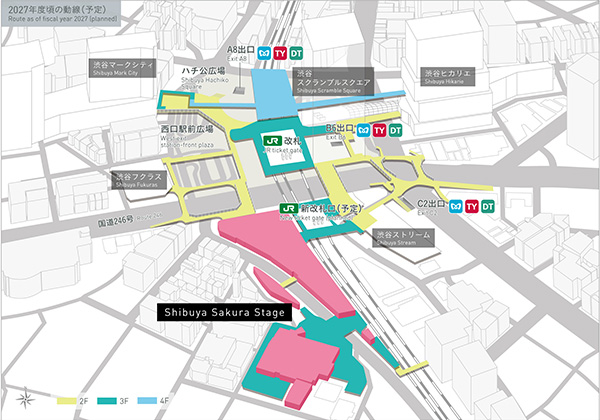
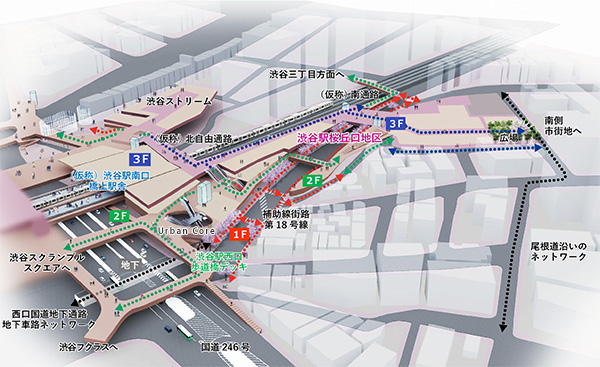
Use of multi-layered approach to improve the flow of foot traffic around Shibuya Station
We developed two pedestrian decks (“Shibunishi Deck” and “SHIBUYA FUKURAS Connection Deck”) to connect Shibuya Station with “SHIBUYA FUKURAS” and “SHIBUYA MARK CITY.” There is easy access to Sakuragaokacho via the pedestrian walkways in SHIBUYA FUKURAS and the Shibuya Station West Exit pedestrian bridge, ensuring there are pedestrian routes that allow substantial flow of foot traffic even when there is construction in the area around the station.
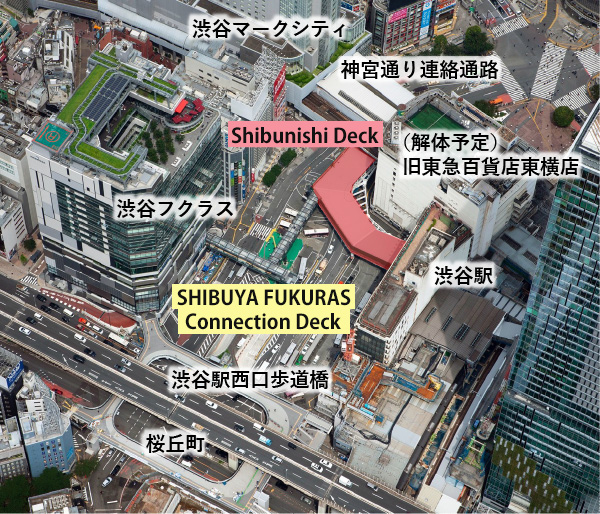
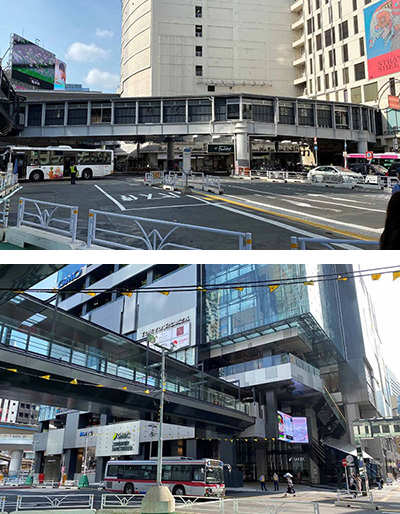
Through the development of city planning road Auxiliary Line No. 18 and access roads, along with pedestrian decks on the site, we have enhanced transportation networks within and outside the area, and also secured routes for emergency vehicles, etc. At the same time, we have moved electric power lines and other infrastructure underground and lined the road with cherry trees, which has enhanced the site’s disaster prevention qualities, while also contributing to enhancing the scenic appeal of the local townscape.
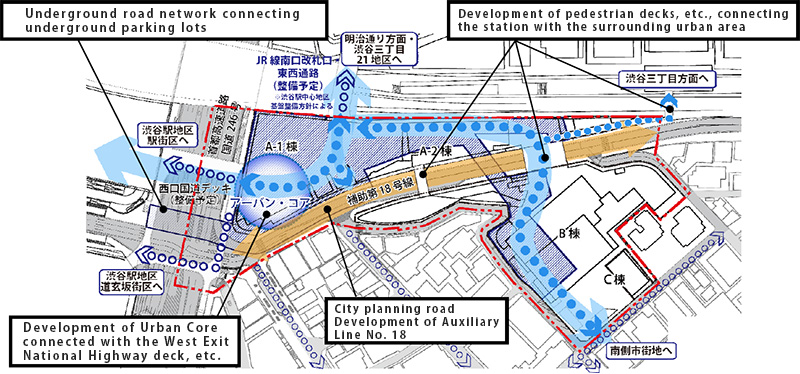
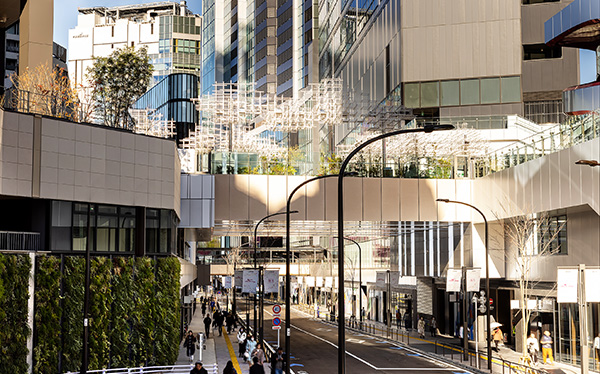
As a disaster prevention site in the development of the area around Shibuya Station, we developed a temporary stay facility capable of accommodating approximately 4,700 people, in cooperation with major development projects in the surrounding area.*
SHIBUYA SOLASTA, SHIBUYA FUKURAS, and Shibuya Sakura Stage
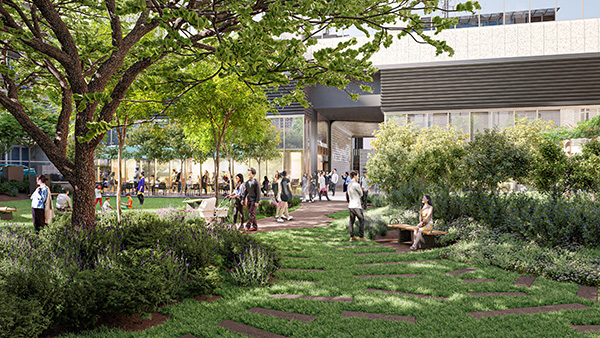
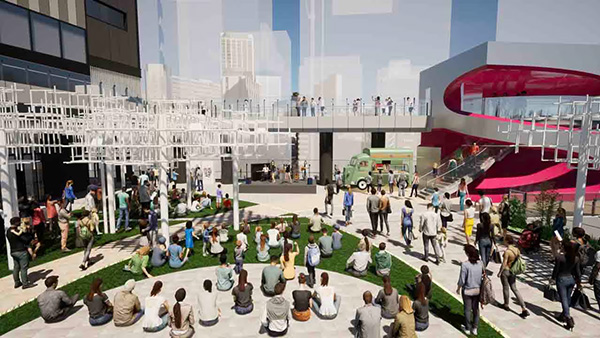
We have developed a disaster prevention stockpiling warehouse covering approximately 200m², to ensure three days’ worth of disaster supplies for the approximately 2,900 stranded people that the temporary stay facility in “Shibuya Sakura Stage” is capable of accommodating.
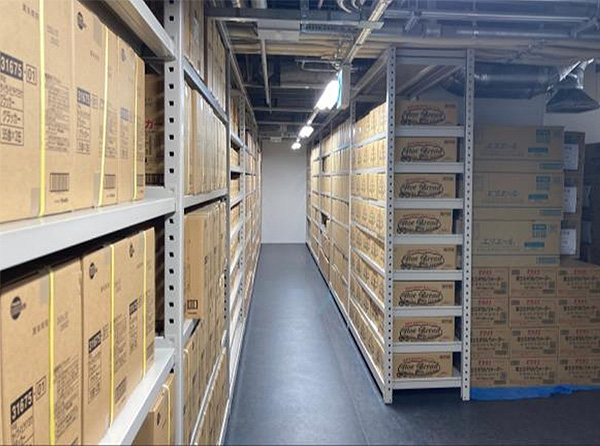
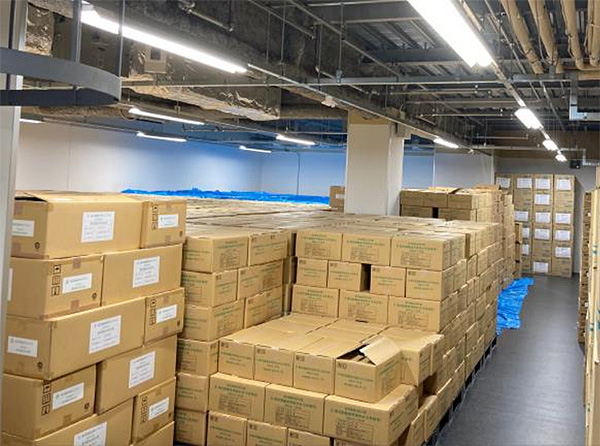
Shibuya Sakura Stage disaster prevention stockpiling warehouse image
“Shibuya Sakura Stage” uses a method of receiving electric power from multiple systems, including a cogeneration system and emergency power generators. A stable supply of power can be ensured, even in the event of disaster, through the installation of emergency power generators in both the SHIBUYA side and the SAKURA side that are capable of using both heavy fuel oil A and medium pressure gas, which uses pipes that are highly resistant to earthquakes, as fuel. This makes it possible to continuously use offices and commercial facilities in the area, enabling a response for people stranded in the event of disaster.
We have installed a cogeneration system on the SHIBUYA side, which supplies electric power (can be supplied while medium pressure gas supply continues) and heat for air conditioning to the SHIBUYA side, and heat for air conditioning to the SAKURA side. In this way, we have created a highly efficient and independent area energy network for this zone.

We have ensured that “Shibuya Sakura Stage” is capable of sharing information for people in offices, commercial facilities, and elsewhere around Shibuya Station and people staying outside in the event of a disaster. Through coordination with the Shibuya Ward Disaster Prevention Center in Shibuya Hikarie, “Committee for People Stranded in the Area Around Shibuya Station,” “Shibuya Station Area Management Committee,” and other organizations, we will utilize digital signage, large screens, etc., to share disaster information and information about the operation of public transportation.
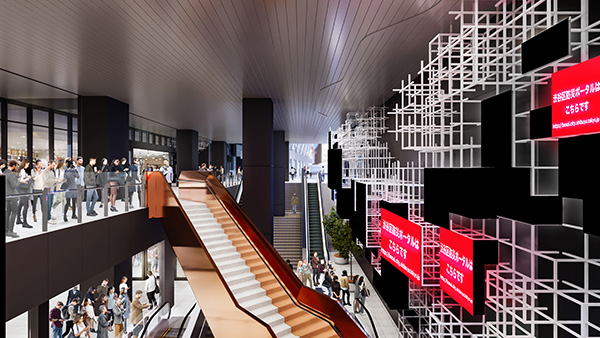
We are leveraging the Group’s abundant experience of community planning to focus on redevelopment projects and the development and operation of complexes, thereby promoting the development of urban infrastructure, including disaster prevention measures to increase urban resilience.
“The Tower Jujo” condominiums are a high-rise residential building with 39 floors above ground, located next to JR Jujo Station. It is a very convenient building, with commercial facilities and public facilities for Tokyo’s Kita Ward in the “J& MALL” on the first through fourth floors.
These condominiums are part of the Jujo Station West Exit Block Type 1 urban redevelopment project, and were completed on the occasion of 20 years passing since a study session for this project in 2004.
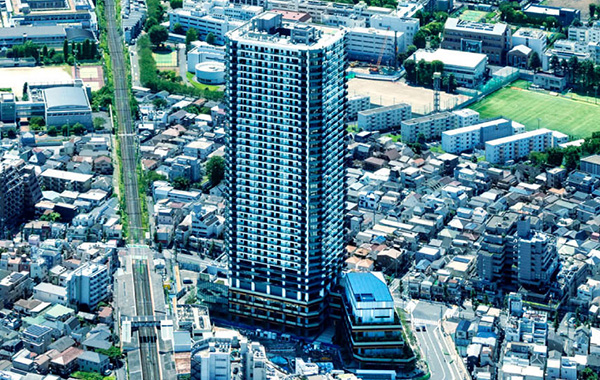
Developing buildings, streets, and other urban infrastructure
Although it was close to the station, there was a cluster of old wooden buildings in part of this area, which was an issue in terms of disaster prevention and the living environment. Many visitors also pass through the area, but vehicle and pedestrian routes were complicated, and no safe and comfortable space had been secured for pedestrians.
Accordingly, through this redevelopment, we succeeded in enhancing the disaster prevention qualities of buildings by consolidating land and enhancing its use, while also ensuring easy access for emergency vehicles in the event of a disaster by widening the main road (Auxiliary Line No. 85) and creating new roads.
Furthermore, we enhanced the area in front of the station and the underground bicycle parking lot, creating a town with safe and secure routes to the area around the station, etc., through barrier-free facilities and other methods.
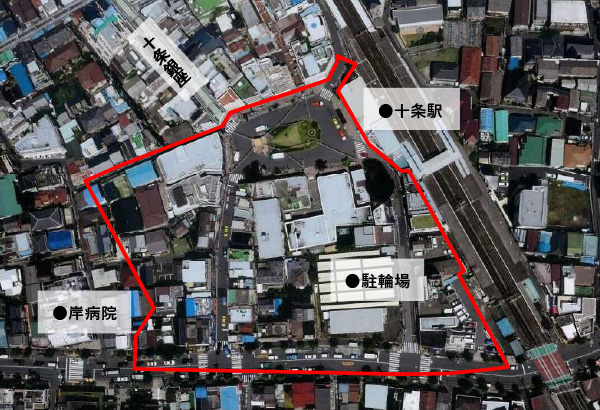
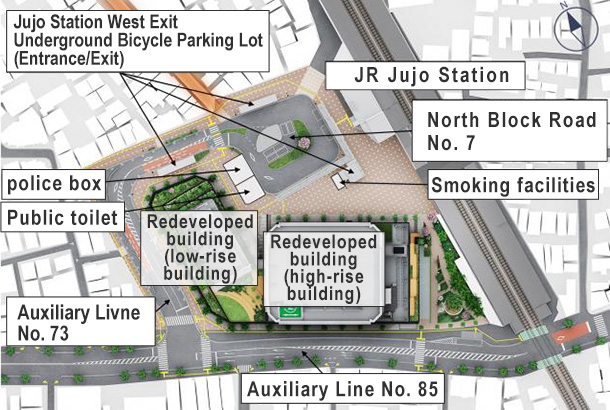
In addition to an expected large-scale earthquake in the future, the increasing severity of natural disasters as a result of climate change has also become an issue. Accordingly, we conducted general inspections of measures that have already been implemented, and we have also implemented the necessary countermeasures in a systematic manner, based on an overall view of all facilities.
We envisioned risks for the following types of disasters: earthquakes, floods, and strong winds, with a focus on the frequency of occurrence and business impact. We summarized the necessary disaster countermeasures after considering the following three perspectives with regard to the continuation of business in the city (office building and commercial facility management): 1. mitigation of damage in the event of a disaster (ensuring safety), 2. ensuring functions after the disaster occurs, and 3. support for recovery activities. We surveyed and identified the status of measures at each facility, while also systematically implementing measures considered insufficient, and thus lifting the level of resilience across the board.
This table can be scrolled horizontally
| Perspective | Disaster | Expected risk | Countermeasures | Examples of countermeasures |
|---|---|---|---|---|
| 1. Mitigation of harm in the event of disaster (ensuring safety) |
Earthquake | Damage to buildings and harm to people in buildings
|
|
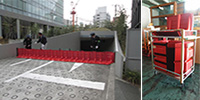 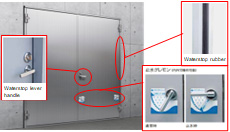 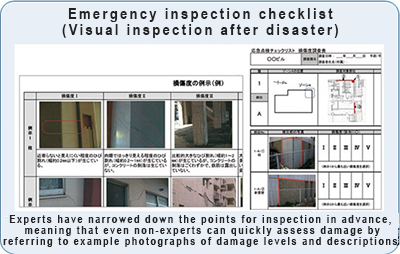 |
| Flood damage | Building flooding, flood damage to key electrical facilities |
|
||
| Strong winds | Falling airborne constructions and abandoned items |
|
||
| 2. Securing functions after a disaster occurs | Loss of functionality of key facilities
|
|
||
| 3. 3. Support for recovery activities |
Damage to key rooms and loss of functionality Structural damage ⇒ Assessment of ability to use facilities |
|
||
Tokyu Community Corp. offers a disaster countermeasure support service for residents’ management associations, to ensure that residents in condominiums can live more safely and securely, and in greater comfort.
In order to enhance anti-disaster capabilities, we hold seminars and stockpiling experience events for residents of condominiums. We have also prepared and distributed the “First Steps for Condominium Disaster Prevention BOOK,” in order to ensure a certain level of understanding among people getting involved in condominium disaster prevention for the first time, and to enable them to spread knowledge of their understanding among other residents.
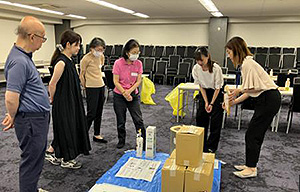
Tokyu Land Corporation and Tokyu Community Corp. have introduced “Juren,” a mobile battery rental service equipped with storage batteries, at the “BRANZ” condominiums, to contribute to securing sources of electricity for important mobile devices to enable residents to contact family members and obtain necessary information even in the event of a disaster. In a disaster or other emergency, “Juren” is equipped with a system that will automatically switch to a “disaster response mode” to enable residents to use it free of charge. This means residents will be able to charge their smartphones, an important means of communication, and will also facilitate the supply of power to radios, torches, etc., with attached outlets for home use.
At “Grancreer,” a senior residence managed by the Group, we are strengthening our disaster prevention measures, including preparing stockpiles, holding study sessions, and regular evacuation drills.
At Grancreer, we offer residents safety and security by holding regular disaster prevention drills, covering everything from large-scale drills at the residence with attendance from the responsible fire station, to firefighting drills by residents and staff.
At all residences, we have prepared stockpiles of emergency food, emergency generators, and assemblable toilets for use in the event of a disaster, and elevators are also usable even in blackouts and other emergencies. We have also installed automated external defibrillators (AEDs), and we conduct related drills. We have set a level of three days’ worth of emergency food as the minimum level of stockpiles, and have prepared stockpiles for all residents and staff.
A basic aspect of disaster countermeasures is ensuring a means of communication. When telephones cannot be used, we will use alternative means of communication (disaster prevention radios), and work to quickly and accurately gather information through coordination between each residence and TOKYU E-LIFE DESIGN Inc. head office, as well as between each residence.
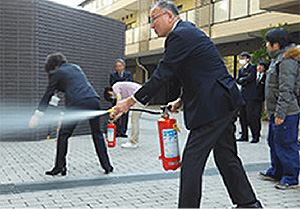
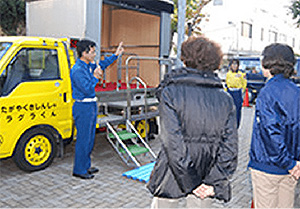
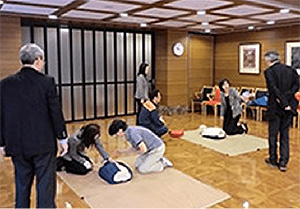
The Group has formulated action plans related to business continuity in the event of disaster. These plans establish matters such as lines of command and the division of responsibilities for business continuity in the event of a disaster, thus establishing a system to minimize the impact of disasters. In order to enhance the effectiveness of our business continuity planning (BCP), we have also established Business Continuity Management Regulations, and we take steps to enhance the level of these efforts by implementing the PDCA cycle in normal times and conducting drills.
In particular, we have established “crisis management response,” focusing on earthquake countermeasures, as a priority risk for the Group to address, and we are focusing on strengthening our BCP. Specifically, Tokyu Land Corporation conducted an integrated company-wide earthquake drill for the first time, in which all employees participated in a series of action drills covering all processes, from identifying the status of damage at each facility, through reports on the status of damage to each business division, and information consolidation at the company-wide disaster taskforce. We developed a dedicated tool for visualizing the status of damage, which was found to be an issue in the drill, contributing to reducing errors in the communication of information and lost time spent on reports. Going forward, in anticipation of conducting integrated training across the entire Group, we will take steps to enhance the level of earthquake drills at each Group company, as part of our aim to be a group with strong resilience toward disasters.
In the “Greater Shibuya area,” the Tokyu Group is promoting community planning in Shibuya from the dual perspectives of urban development and initiatives to enhance the appeal of the area.
Tokyu Land Corporation is promoting sustainable area management through Shibuya Ekimae Area Management Association, established in August 2015.
Based on special rules approved by the Tokyo Advertising Council, we have created a space for outdoor advertising in the public space outside Shibuya Station, and are using the proceeds from this space for public-interest activities, such as stimulating the local economy and cooperating with clean-up efforts. We are also working to enhance the appeal of the area through collaboration between the government and the private sector based on the theme of “Move Shibuya with a playful heart. SHIBUYA +FUN PROJECT,” and we are actively participating in festivals and other activities with the local community.
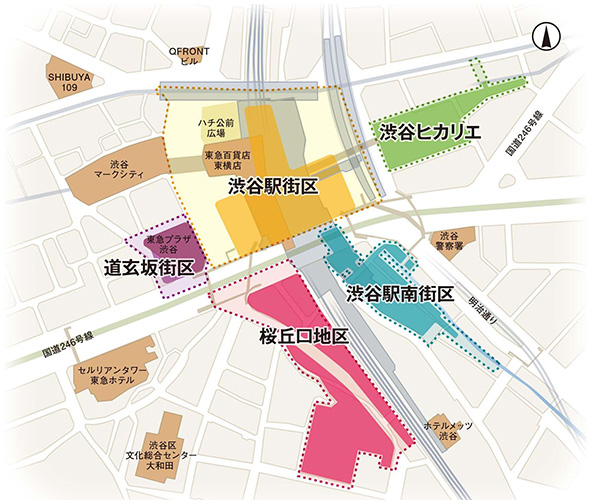
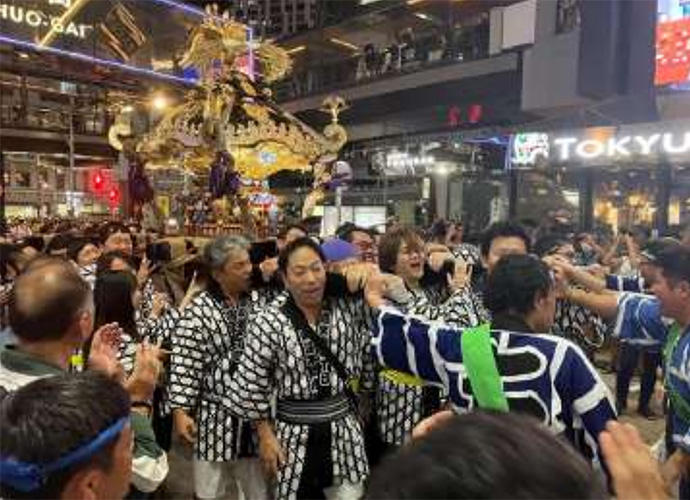
In the central area of Shibuya on the south side of “SHIBUYA MARK CITY,” new rules for cargo handling have been established, with the aim of creating an area that is easy to enjoy on foot. Congestion caused by the parking of delivery vehicles was an issue, owing to the large amount of foot traffic and narrow roads in the area. Under these circumstances, we created “ESSA,” a local cargo handling site, on the second underground floor of SHIBUYA FUKURAS, in addition to parking meters for cargo installed on Plaza-dori. By reducing cargo handling above ground, we have protected the safety of pedestrians and created an area that is easy to enjoy on foot.
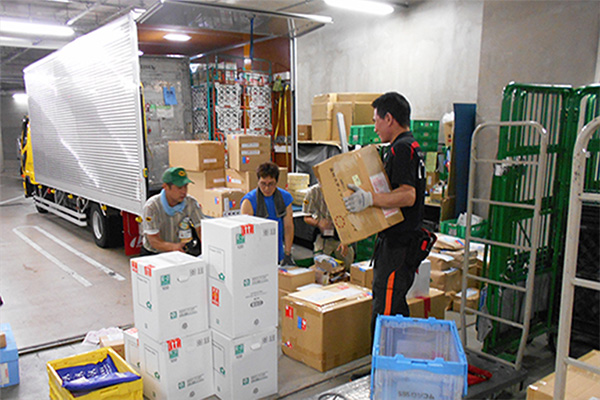
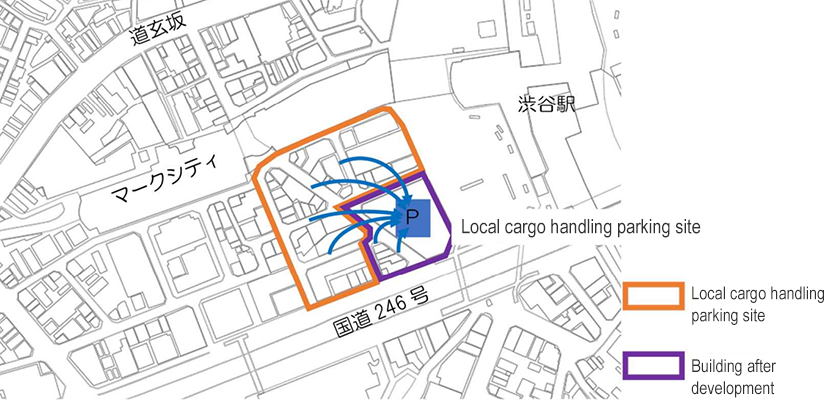
At the bus terminal on the first floor of “SHIBUYA FUKURAS,” in addition to buses on regular routes, airport limousine buses traveling between Haneda and Narita airports also arrive and depart from next to facilities that support tourism. Truly, it acts as the entrance hall for tourists visiting Shibuya, both from within Japan and overseas.
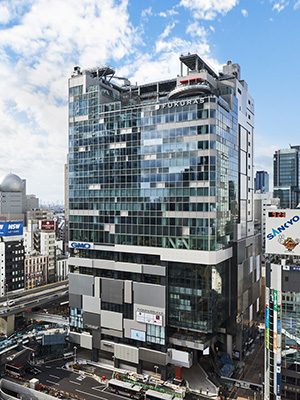
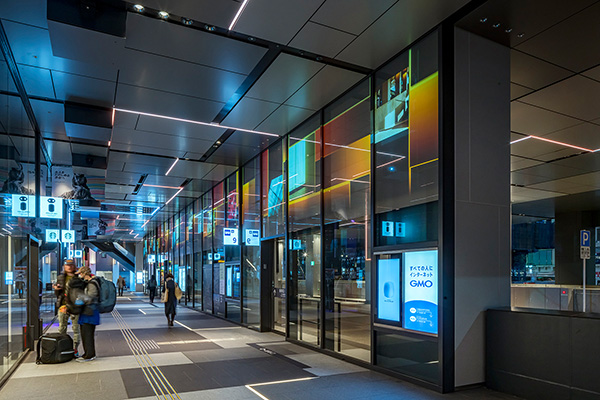
Tokyu Fudosan Holdings conducts an environmental education program as part of “Shibuya Future” exploratory classes in public elementary and junior high schools in Shibuya. To date, we have conducted this program at Kakezuka Elementary School (Ebisu, Shibuya), Sarugaku Elementary School (Daikanyama, Shibuya), Sasazuka Elementary School (Sasazuka, Shibuya), and other schools, and we intend to continue providing ongoing support for environmental education at public elementary and junior high schools in Shibuya. Through this initiative, we aim to support the development of “autonomous learners who actively participate in global society,” in line with the aim of Shibuya Ward, while also creating opportunities to contribute to awareness of environmental issues among future generations and action to create a sustainable society as an environmentally advanced company.
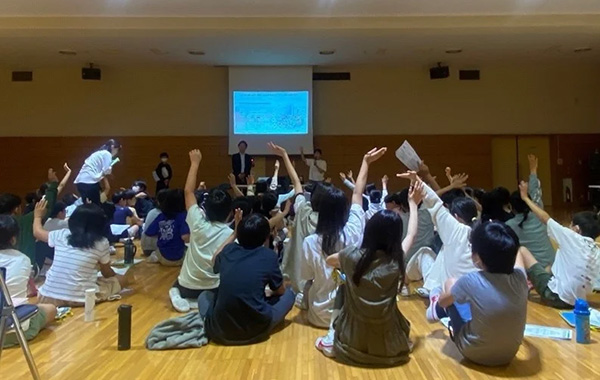
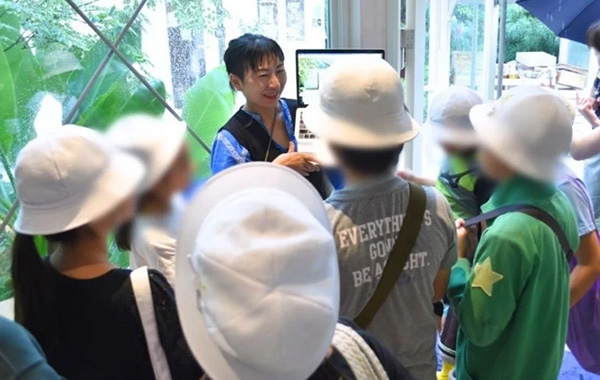
Image of a class
The Group is promoting community planning in cooperation with Shibuya Ward.
Tokyu Land Corporation and Shibuya Ward have collaborated in various fields to enhance the urban value of Shibuya, including large-scale redevelopment focusing on the likes of zone reorganization and shared use of facilities, as well as participation in and cooperation with local events, with the aim of solving issues in the area. To express our gratitude to the local community and local people, and further contribute to a bright future for Shibuya, Tokyu Land Corporation concluded a “Comprehensive Collaborative Agreement on Local Disaster Prevention in Shibuya Ward” with Shibuya Ward. Both parties will work to enhance local disaster prevention capabilities in Shibuya, through collaboration between the government and the private sector.
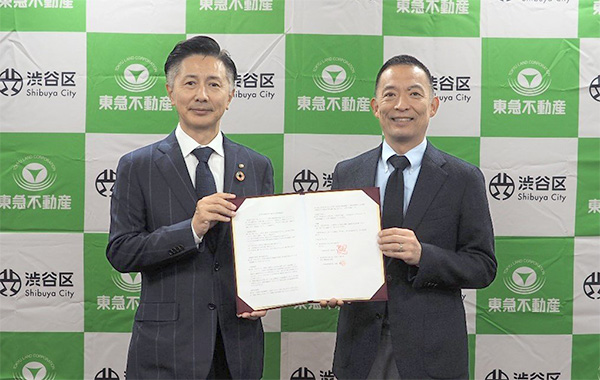
In June 2024, Tokyu Land Corporation held the first joint exhibition for disaster prevention awareness utilizing drones for disaster prevention, in a collaboration between Shibuya Ward and Tokyu Land Corporation, at the “FY2024 Shibuya Ward General Drill, Shibuya Disaster Prevention Caravan,” held by the Shibuya Disaster Prevention Action Committee. It was a fun hands-on disaster prevention drill, where anybody could easily participate, jointly held by independent disaster prevention organizations and Shibuya Ward, which have continuously engaged in disaster prevention activities in the local community.
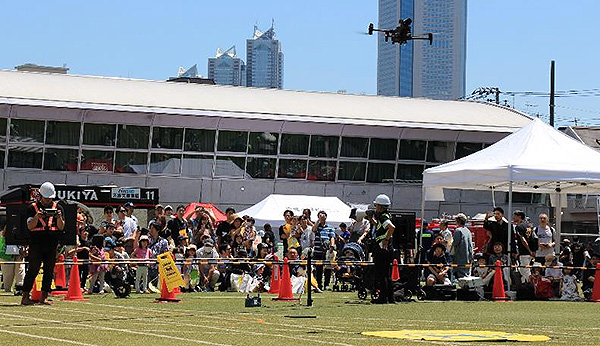
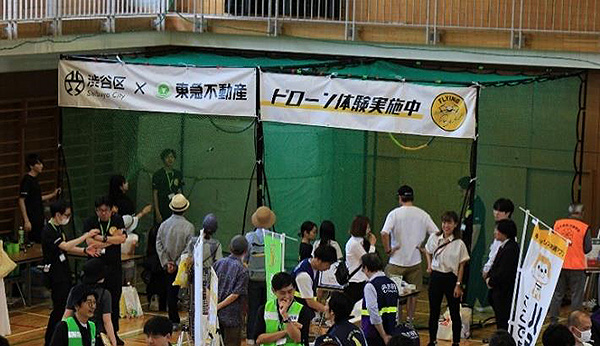
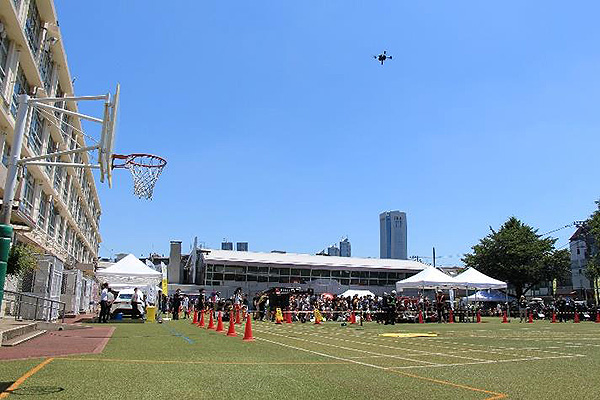
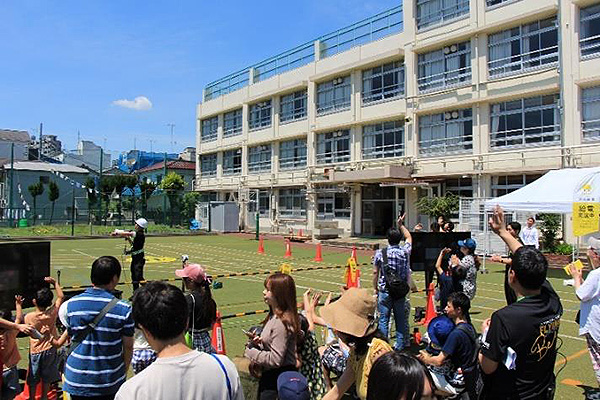
Image of the Shibuya Disaster Prevention Caravan
In October 2024, Tokyu Community Corp. concluded a “Joint Research Agreement,” aimed at solving issues such as residential damage certification surveys when disasters occur through mutual collaboration with Shibuya Ward. Based on the conclusion of this Joint Research Agreement, Tokyu Community Corp. is working on research aimed at speeding up “residential damage certification surveys” and the “issuance of disaster victim certificates,” to enable local residents to return to “normal, everyday life” as soon as possible after disasters. In this way, we will contribute to making Shibuya a “flexible and tough” town, in line with the aim of Shibuya Ward.
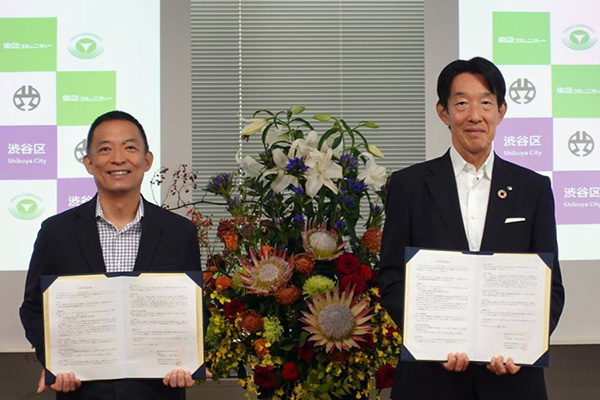
Offices that are considerate of the people working there and the environment, commercial facilities that act as landmarks for the area, and urban development projects that combine these elements. We envision an urban area that is appealing for the people that live there, work there, and spend time there, and we are focusing on creating new “stimulation.”
Ofuna Station is a terminal station used by approximately 190,000 people per day, located on the border of Kamakura and Yokohama in Kanagawa, but progress on the development of urban infrastructure was slow in the area around the station. Issues included the narrow bus terminal, making turning difficult, the lack of a taxi space, aging public bicycle parking lots and wooden buildings, and insufficient open space required in the event of disaster. As a result of a redevelopment project in which Tokyu Land Corporation participated in 2014, the large commercial facility “GRAND SHIP” and the residential building “BRANZ Tower Ofuna” opened in 2021, bringing new stimulation to the area. Tokyu Community Corp. participated in area management as part of its property management operations, promoting exchange with the local community and community development that integrates residential and commercial properties.
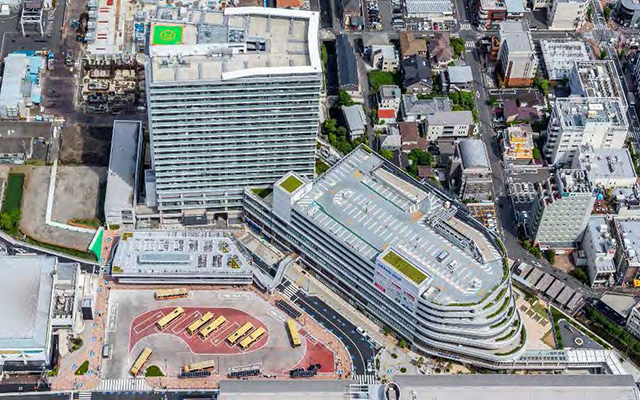
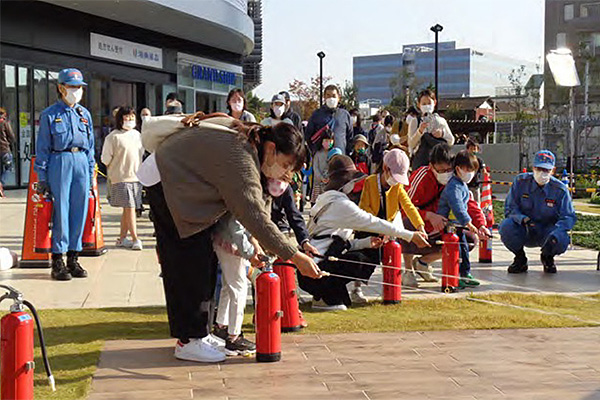
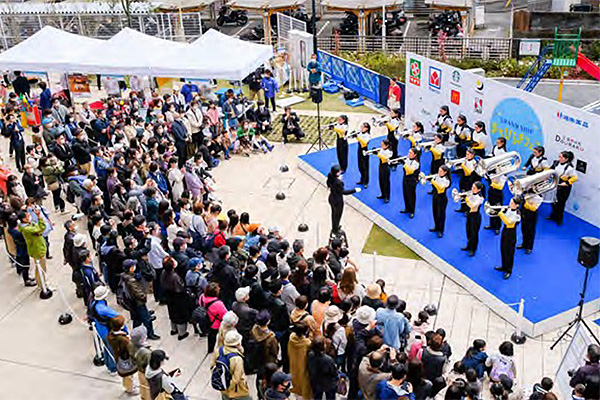
Tokyu Land Corporation has also been focusing on area management activities in major complex development centered on “BRANZ Tower Toyosu,” a new condominium building in Toyosu, Koto, Tokyo. By utilizing green spaces and promenades on this site to hold events in collaboration with existing local organizations, we are contributing to creating ongoing stimulation in the local community, and further stimulating and enhancing the value of the Toyosu area.
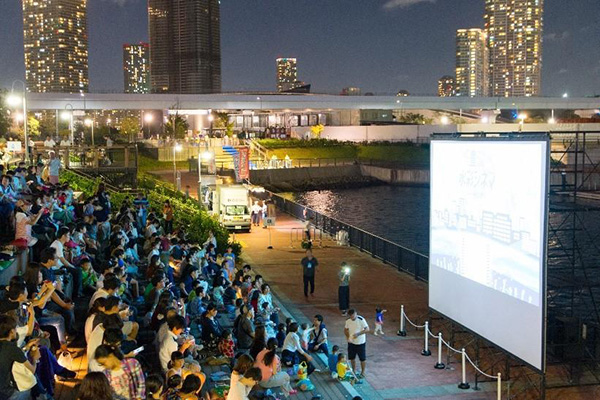
At “BRANZ City Hongodai,” a condominium building with a total of 458 units in Sakae, Yokohama, we have introduced a “community support program” aimed at ensuring the spread of the community utilizing common-use facilities as spots for exchange between residents. We are creating a mechanism in which, not only do we support free activities between residents, but we also collaborate with municipal associations and organizations active in the local community to create opportunities for exchange with the local community.
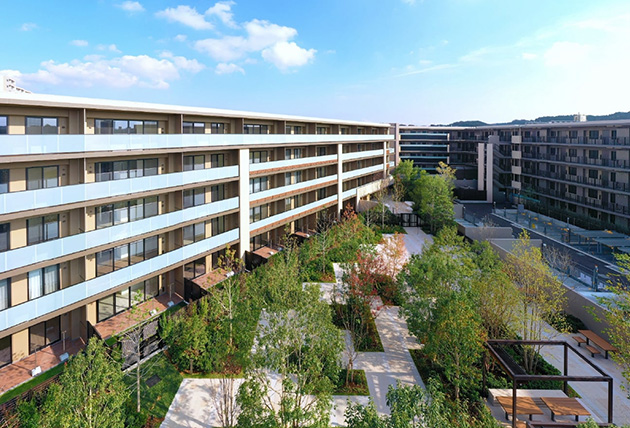
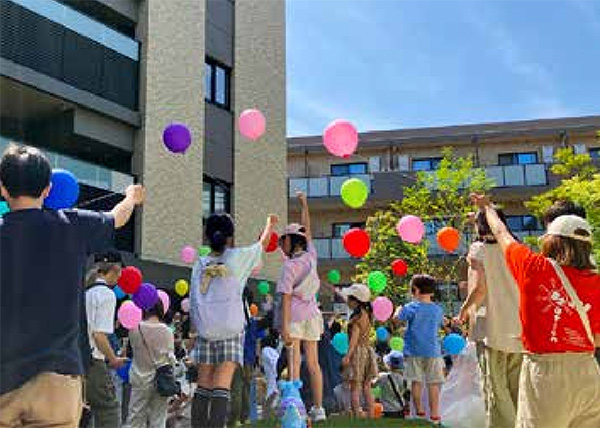
Tokyu Land Corporation is engaged in the “Smart City Takeshiba” smart city project in areas where Takeshiba Area Management, a general incorporated association, is active. We are promoting initiatives based on this project’s selection as a “smart city implementation support project” led by the Ministry of Land, Infrastructure Transport and Tourism in FY2020, “ProjectPLATEAU,” and “Smart City Tokyo,” led by Tokyo Metropolitan Government. In Japan, it is forecast that there is a 70% probability of an earthquake occurring directly underneath Tokyo within the next 30 years (as of 2020), meaning that strengthening disaster prevention capabilities is a pressing issue. We aim to use real-time disaster prevention information sharing and disaster simulations based on digital twinning to solve issues in the Takeshiba area, by combining Tokyu Land Corporation’s knowledge of urban development and area management with SoftBank’s technology.
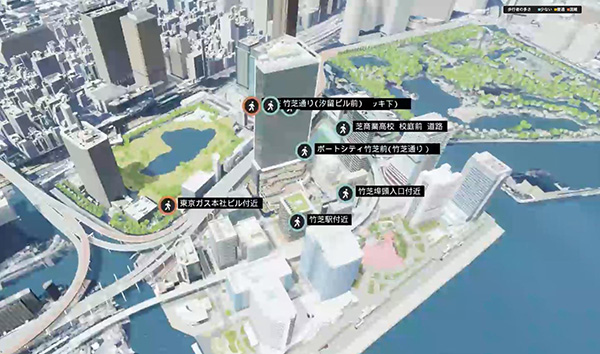
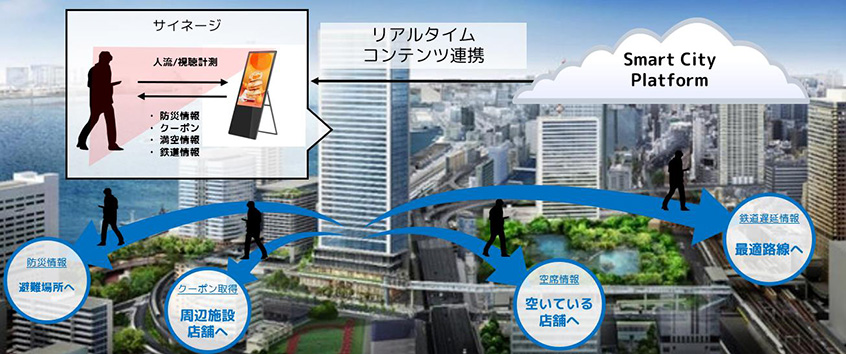
Since 2014, Tokyu Land Corporation has been engaged in a Renewable Energy Business, which is environmentally friendly, with the aim of resolving social issues through our business activities. As a comprehensive developer, we leverage our knowhow from pursuing large-scale development efforts with the understanding of local communities to develop solar power plants, wind power plants and so forth across Japan, while also submitting proposals for the introduction of renewable energy to local regional governments promoting onsite and offsite power purchase agreement (PPA) models, etc. In this way, we are doing our part for the realization of a sustainable society.
Tokyu Community Corp. collaborated with ReENE Co., Ltd., a Group company that operates an electricity retail business, to conclude an electricity supply and demand agreement based on ReENE’s “Effectively Renewable Energy Plan” at three facilities among “the Bunkyo multi-purpose gymnasium and six other sports facilities,” for which the designated manager is the Bunkyo Sports Promotion Consortium, in which we participate as a member organization. As a result, in April 2024, we converted the electric power used in these facilities to renewable energy.
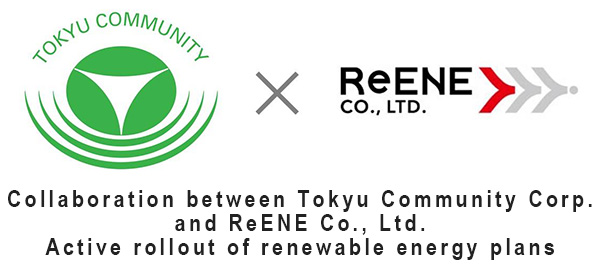
Based on our submission to a public call for proposals, in February 2023, Tokyu Land Corporation was selected as an operator to introduce PPA-based solar power generation equipment in 53 elementary, junior high, high and special assistance schools in Yokohama City. We introduced solar power generation facilities and storage batteries, enabling schools to use power during the day, and store excess electric power in storage batteries. At night and when it is raining, schools can use electric power from the storage batteries, facilitating the reduction of approximately 1,780,000 kg-CO2 emissions per year, equivalent to a reduction of approximately 26% compared with previous levels.
Furthermore, on weekends and holidays, these facilities supply electric power to commercial facilities and hotels in the city, making the maximum possible use of electric power generated from renewable energy within the local community. These facilities can also function as emergency power sources, including the use of emergency outlets and storage batteries to charge computers and cellphones in the event of a disaster.
In August 2022, Tokyu Land Corporation began a “local production and local consumption” initiative to supply renewable energy from within Fukushima to users in the same prefecture. We supply electric power generated at the “ReENE Aizu Solar Power Plant” (4.7MW) in Fukushima (Aizubange, Kawanuma) to users of electric power in the prefecture through specified wholesale supply, providing them with non-fossil value. We intend to return part of the profits to the local government in the area where the power plant is located, in the form of “regional revitalization funds.” Based on the “Fukushima Prefecture Locally Produced Renewable Energy Electric Power Utilization Expansion Project,” in this initiative, we aim to utilize a “Good Around” service to achieve the following: (1) expansion of the use of renewable energy in the prefecture, (2) decarbonization of stores and factories, and (3) revitalization of the local community in the area surrounding the power plant.
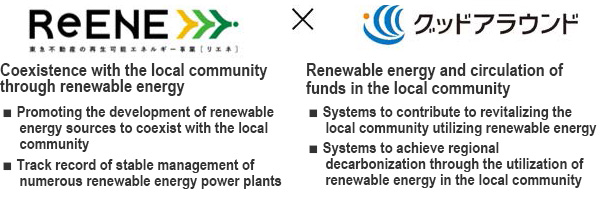
In areas around Japan where it operates its businesses, Tokyu Land Corporation is working to solve regional issues and revitalize each local community, while also achieving coexistence with local communities, by utilizing existing facilities as regional assets and resources and making use of environmentally friendly construction. We use “Tenoha*” as the name for facilities that act as the site or stage for these activities.
“Tenoha” is a portmanteau of the Japanese words for “palm of the hand” and “leaf.” It expresses the idea that the facilities are like large trees, and new lifestyles are like a multitude of leaves, with the hands that create things overlapping and spreading out like leaves, and that these facilities will be places for nurturing people, goods, and businesses for new eras.
In the town of Matsumae, Hokkaido, we have been operating the “ReENE Matsumae Wind Power Plant,” an onshore wind power generation business, since 2019. In December of that year, we concluded an agreement related to the “promotion of the Renewable Energy Business and regional revitalization.” Subsequently, we have collaborated with Matsumae municipal government to revitalize the local community and implement community planning, and we have promoted sustainable community planning since March 2023, when we jointly established the “Smart Shrink SX Vision.” The Company has positioned Matsumae as an important site for the wind power generation business, and we have established a site for promoting community planning aimed at coexistence with the local community. We are also implementing initiatives to help members of the local community feel the value of wind power generation in their lives, including classes at elementary schools, painting pictures on wind turbines, and supplying electric power generated from the wind for local festivals.
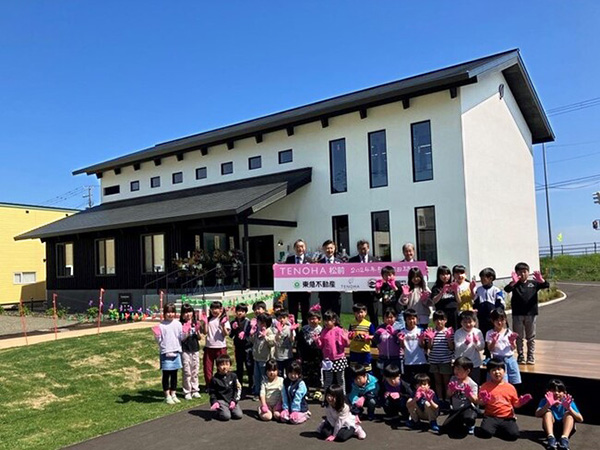
「Tenoha “Tenoha Higashi-Matsuyama” (Higashi-Matsuyama, Saitama) is a building created by renovating an existing restaurant in “ReENE Solar Farm Higashi-Matsuyama,” which utilizes solar sharing (solar power generation on agricultural land). This facility features demonstration exhibitions of the latest technology, and a combined café and coworking space where visitors can try produce grown at a solar farm.
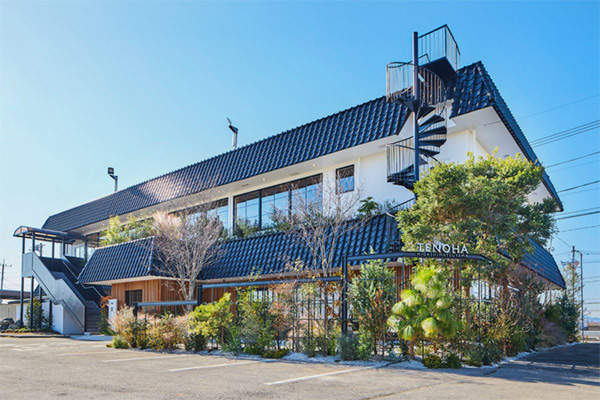
At “Tenoha Noshiro” (Noshiro, Akita) and “Tenoha Oga” (Oga, Akita), we create spaces to “nurture people, goods, and businesses” by renovating existing facilities in collaboration with partners in the local community. We will focus on creating facilities that contribute to regional revitalization, through the collaborative management and mutual use of each facility. Through collaboration with partners such as Hokuto Bank, Ltd. and National Institute of Technology, Akita College, we provide space for exchange within the local community, coworking spaces, and shared offices, utilizing schools and offices near stations.
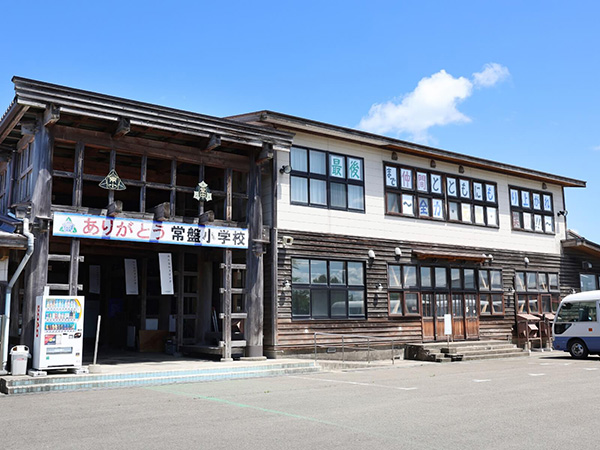
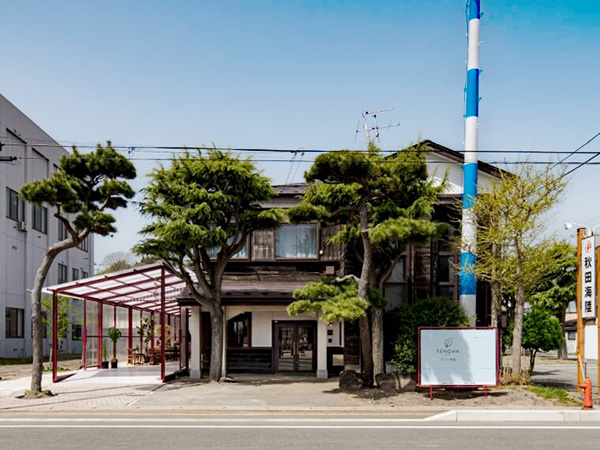
“Tenoha Daikanyama” in ForestGate Daikanyama (Shibuya, Tokyo) is made up of a cafe and event space. With a focus on providing a sustainable lifestyle experience, it serves as a site of activity that bridges the local community and the city in cooperation with business operators who conduct circular economy activities and the local government. While supplying points of contact with sustainable endeavors to consumers, we will link up with various stakeholders to realize a circular economy.
In a manner befitting the building’s status as a site for these activities, it is a two-story wooden building that utilizes building materials harvested from thinning in the village of Nishiawakura in Okayama Prefecture, which contains a forest targeted by Tokyu Fudosan Holdings for preservation, and has been built in a way that will enable the timber to be reused when it is deconstructed. The design is based on the theme of the global environment, and was overseen by SUEP., which focuses on environmentally friendly architectural designs for a new era of coexistence between nature and buildings.
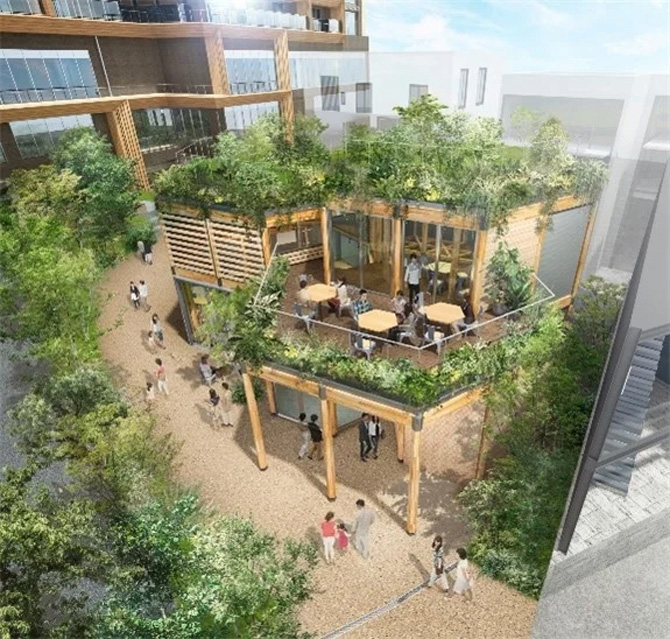
At “Tenoha Tateshina” in TOKYU RESORT TOWN TATESHINA (Chino, Nagano), we aim to achieve true “coexistence with the environment” through co-creation based on facing the “regional environment” and the “natural environment.” For many people, there is still a sense of the “extraordinary” about the “environment,” but we opened this facility to create value “in collaboration with the local community” and “with consideration for the environment,” as well as to be a site for sharing information, to enable visitors to the town to change their awareness of the environment to the “everyday” by the time they return home. We use thinned wood from within the town for all wall surfaces and furniture in Tenoha Tateshina, and it is designed in a way that lets visitors experience nature first-hand. Local lumbermills and workshops cooperated with us to make these furnishings, and we successfully collaborated with the local community through the use of this wood. In our hotels and dining facilities, we are also engaged in multiple “initiatives to connect regions through food” that utilize our expertise as a company that promotes the environment.
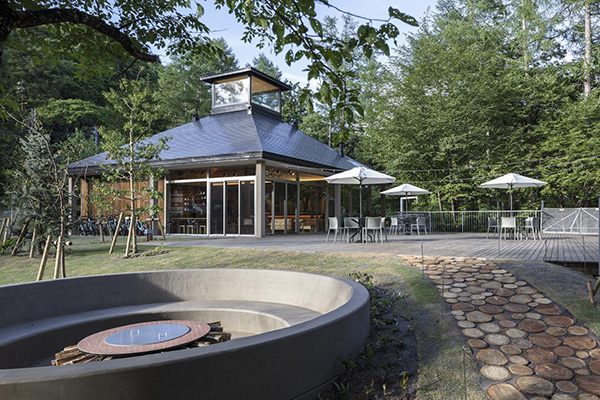

“ReENE ÉCOLE is an environmental education program, the name of which was created by combining the brand name of Tokyu Land Corporation’s Renewable Energy Business “ReENE” with ÉCOLE,” meaning school in French, and it incorporates the meaning of a “place of learning that values the local community and the global environment.” At places such as “Tenoha,” facilities for coexistence with the local community that we operate across Japan with the objective of solving issues in local communities and regional revitalization, we hold hands-on events where participants can learn about environmental conservation and the utilization of renewable energy. Children from regions with power plants and elsewhere throughout Japan can have fun while learning about environmental problems, with a focus on renewable energy.
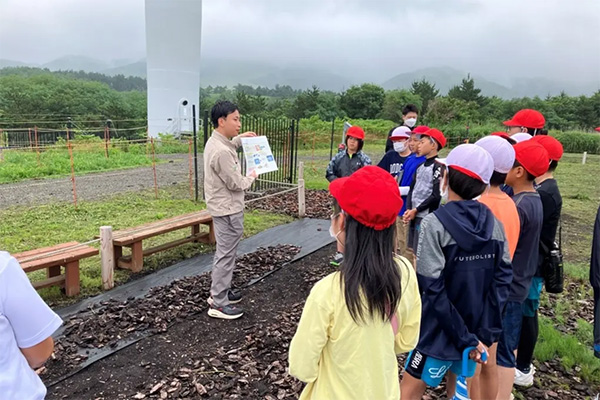
At the Group’s stores, etc., we are engaged in various initiatives for exchange with local communities with strong regional ties.
We use signage at some TOKYU LIVABLE INC. stores to provide local information, etc., such as notifications from local governments and information about well-known tourist attractions, in collaboration with administrative agencies, utilizing the high visibility of these stores’ locations in front of major stations. As part of our aim to operate stores with roots in local communities, we also sponsor and make donations to regional events.
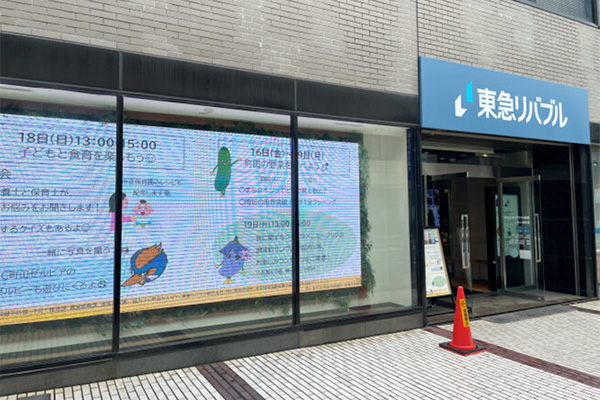
At “Amagasaki Q's Mall” (Amagasaki, Hyogo), we are promoting the “GrinGreen Project” to foster exchange with the local community through events related to plants. We have developed an area of unused green land covering approximately 300m2 on the site as “Q’s Farm,” where we hold agricultural events and events in collaboration with the local community. We aim for it to be a place where visitors can experience farming, food, and flowers, and come into contact with nature, enabling them to feel a connection with the region.
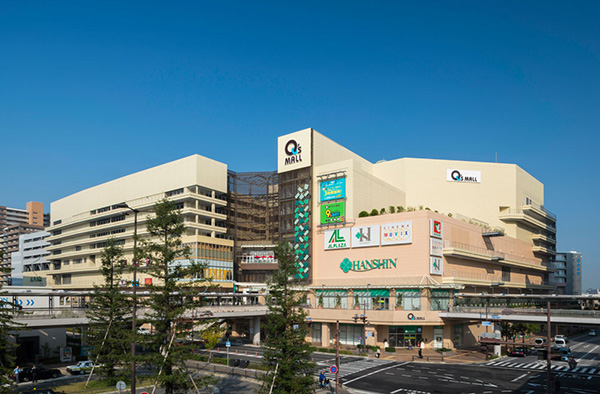
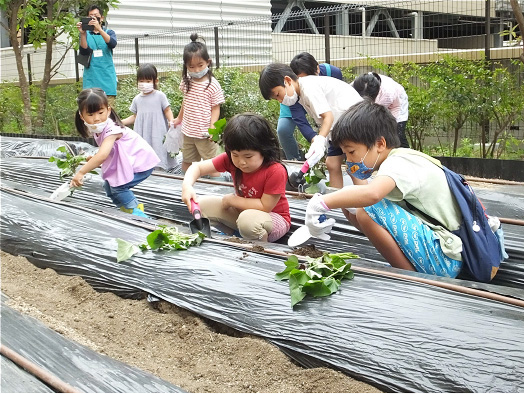
“GrinGreen Project” for exchange with the local community at Amagasaki Q's Mall
The “Mandoro Fire Festival” is a traditional festival in Kayano, Minoh, Osaka, where “Minoh Q's Mall” is located. In August 2022, this festival was held jointly with the Q’s Summer Festival planned by Minoh Q’s Mall, with approximately 3,000 people attending. There was a procession of lanterns and torches along the banks of the Senri River. Through this initiative, we collaborated with members of the local community to create a vibrant festival on a large scale.
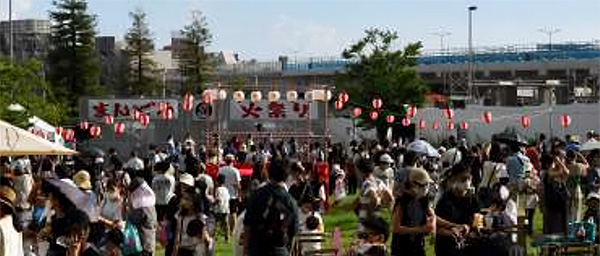
At Kawasaki Daishi Park, where ISHIKATSU EXTERIOR INC. performs designated management, we held “DAISHI☆NIKKORI☆TONTOKO TOWN,” where we operated a virtual town, mainly for children attending elementary schools in the local community, and participants could learn about social systems by experiencing activities such as working, paying tax, and consumption. We collaborated with parties in industry, academia, government, and the private sector, including local government and companies, as well as a university with expertise related to children’s towns around the world, and we will continue to hold this event in the future.
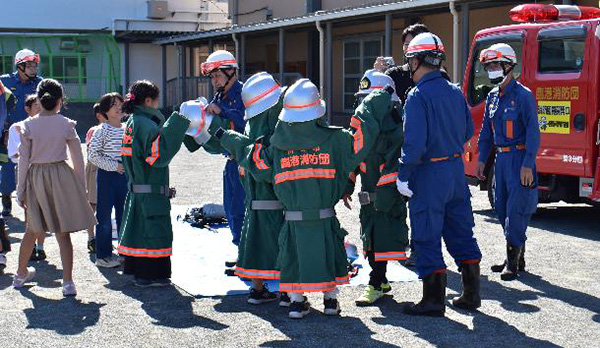

Kids event at Kawasaki Daishi Park
Tokyu Fudosan Holdings and National Students Information Center CO., LTD. held the “Student Mirai Community Project,” a paid workshop for thinking about social issues with students, based on the “Collaborative Agreement on Enhancing Student Life in Kyoto, a City of Universities and Students,” concluded with Kyoto City.
In FY2023, 15 university students in Kyoto created a digital book based on interviews with former exchange students working in Kyoto. They explored topics they wished to learn about, such as why the exchange students chose to study abroad in Kyoto and why they found work at companies in Kyoto, the motivation for their work, and their aims for their future lifestyle, and created a realistic guide with content that students really want to read. At the same time, they also created interview videos and a behind-the-scenes video, with the potential for sharing overseas.
As part of the Tokyu Fudosan Holdings Group's commitment to promoting sustainability, NATIONAL STUDENTS INFORMATION CENTER CO., LTD., sponsored the Kyoto Marathon 2025, has installed 150 clean boxes bearing the group's logo along the course. Going forward, the group will continue to work together to promote the group's corporate activities in Kyoto City, collaborating with various government events and schools.
In cities across Japan, the Group is focusing on initiatives for sustainable coexistence with local communities, leveraging the comprehensive strength of the Group through various projects, including office buildings, commercial facilities, renewable energy, logistics facilities, and resort facilities.
In December 2018, Tokyu Land Corporation concluded an agreement related to “regional revitalization through renewable energy” with Matsumae Town, Hokkaido, as the first step in our regional microgrid business. We are utilizing renewable energy from the ReENE Matsumae Wind Power Plant (40.8MW, 130MWh of storage battery capacity) to strengthen disaster resilience and develop the regional economy. As part of a project receiving subsidies from the Ministry of Economy, Trade and Industry, we are creating a system for supplying electric power to the main parts of the town when there is a major blackout, using Hokkaido Electric Power Network’s grid, after formulating a master plan in FY2020. We have connected wind power generation and storage batteries to the Matsumae Substation, enabling us to supply electric power to public offices, evacuation centers, hospitals, and some homes in the event of a blackout. In the future, we aim to add more renewable energy facilities, enabling us to convert 100% of the town’s electric power to renewable energy even in normal times.
We have also concluded an agreement with the Matsumae Town Board of Education, under which we will offer local children, who will be responsible for the future of the town, opportunities to learn about renewable energy, through classes held by our employees, and tours of wind power plants. We are also conducting environmental education activities through classes and events that make use of the unique characteristics of the region, such as having local high school students make unique original Matsumae soba noodles in a demonstration cultivation of agricultural produce.
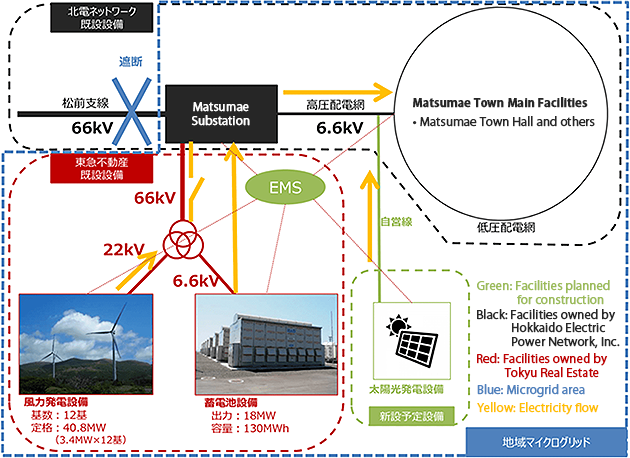
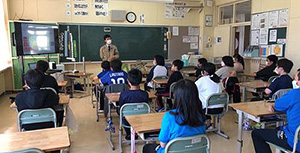
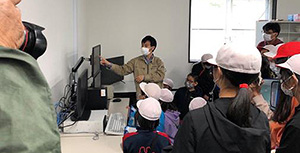
Class held by an employee and tour of a power plant
Tokyu Land Corporation concluded an “Agreement Related to Sustainable Community Planning Through the Use of Renewable Energy” with Ishikari City, Hokkaido, in March 2024. Both parties will utilize a “FY2024 Regional Decarbonization Transition and Renewable Energy Promotion Grant” to jointly promote an onsite PPA project. In this project, we will create two solar power plants in an RE zone in Ishikari, and directly supply electric power generated from renewable energy to data centers in areas with industrial clusters. This onsite PPA project will contribute to the regional utilization of renewable energy and the reduction of CO2 from data centers, and special frames that are highly efficient even in areas with heavy snowfall are expected to maximize the amount of power generated and even spread to other regions.
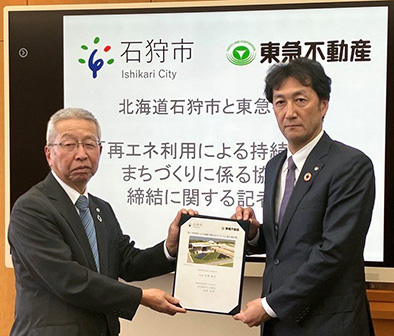
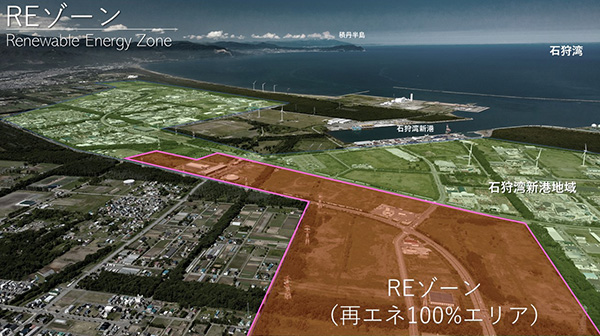
In October 2022, Tokyu Community Corp. concluded a joint research agreement aimed at solving issues such as residential damage certification surveys when disasters occur with Kitahiroshima City in Hokkaido.
In order for victims of disasters to receive public support for rebuilding their lives, etc., residential damage certification surveys are essential for the issuance of disaster victim certificates by municipalities when disasters occur, but the long time required for surveys owing to large numbers of surveys and other factors has become an issue. Now, with the conclusion of this agreement between the Company and Kitahiroshima City, we aim to make the issuance of disaster victim certificates faster and contribute to the prompt rebuilding of people’s lives, by speeding up residential disaster certification surveys, including the utilization of the Company’s expertise from day-to-day building surveys by municipalities, such as the establishment of specific methods for the utilization of the results of building surveys conducted by the Company by municipalities.
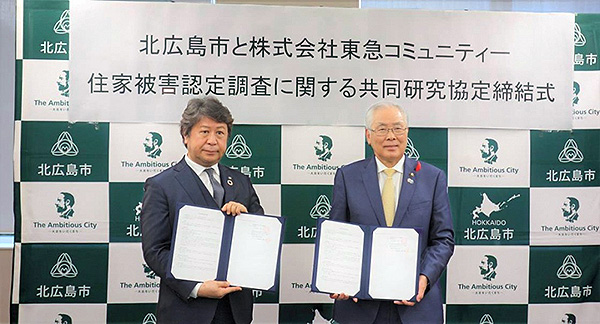
Tokyu Land Corporation and Kutchan Town in Hokkaido concluded a comprehensive collaborative agreement related to the creation of an all-season international resort, on the occasion of the 50th anniversary of the town’s declaration of itself as a town of skiing. In Kutchan, Tokyu Land Corporation operates “Niseko Tokyu Grand HIRAFU,” one of the largest ski resorts across all mountains in Niseko. As the operator of a representative ski resort of the area, we concluded this agreement with the aim of cooperating with Kutchan Town to contribute to enhancing the value of the Niseko area, in order to develop an environment where members of the local community, visitors to the ski resort, and employees can spend better time.
Further regional revitalization is expected in Kutchan, as the town looks forward to the extension of the Hokkaido bullet train in FY2030 and the opening of an expressway. We will engage in mutual collaboration across a wide variety of fields, including consideration for the environment, measures to address regional issues, and collaboration with urban areas, as we aim to create a sustainable all-season international resort that is also loved by the local community, based on our vision for a next-generation resort.
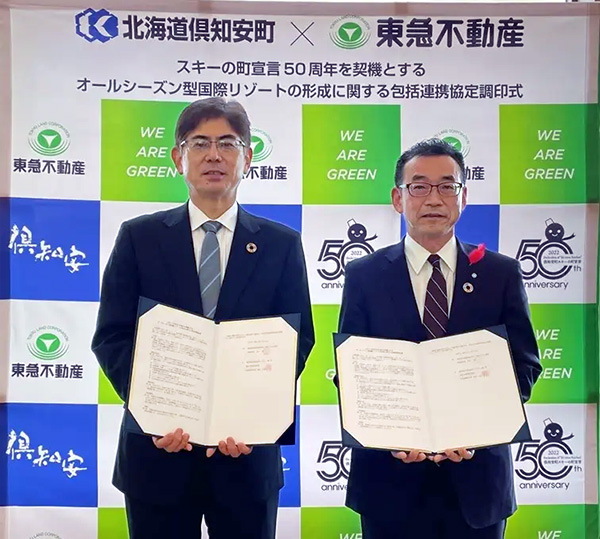
As part of our nature positive initiatives aimed at restoring losses in biodiversity, a foundation of our society and economy, based on the “2050 Sustainable Vision for Nasushiobara ~Declaration of Environmental Strategy Action~” declared by Nasushiobara City in Tochigi, Tokyu Land Corporation has concluded a collaborative agreement with the objective of contributing to the achievement of a “sustainable environmental city” and the “enhancement of regional brand strength,” by working to simultaneously achieve all targets through synergies based on mutual collaboration between initiatives aimed at achieving a decarbonized society (carbon neutrality) and initiatives aimed at transitioning to a circular economy. At the resort town complex “Tokyu Nasu Resort,” the Group will offer visitors time to relax through leisure activities such as golf and hot springs and accommodation experiences, while also contributing to solving regional issues in the Nasu area.
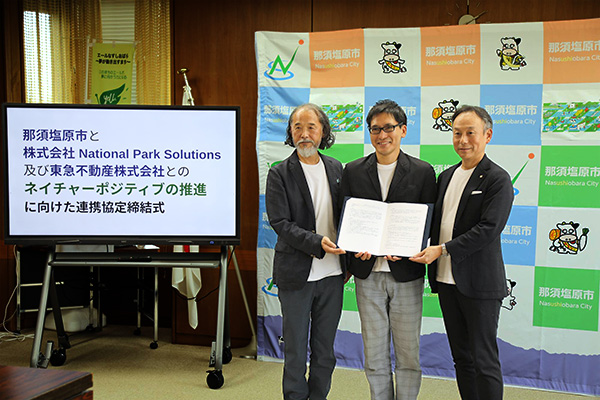
In June 2024, Tokyu Community Corp. concluded an “Agreement Related to the Protection of Local Residents, etc., and Regional Development” with Itabashi Ward, Tokyo, with the aim of achieving regional development through mutual support to ensure that residents of Itabashi Ward can “continue to live forever with peace of mind in the town where they are used to living.” Through this collaboration, both parties will promote the creation multi-layered support systems for local residents, as well as the enhancement of local welfare services and the creation of society based on coexistence with the local community.
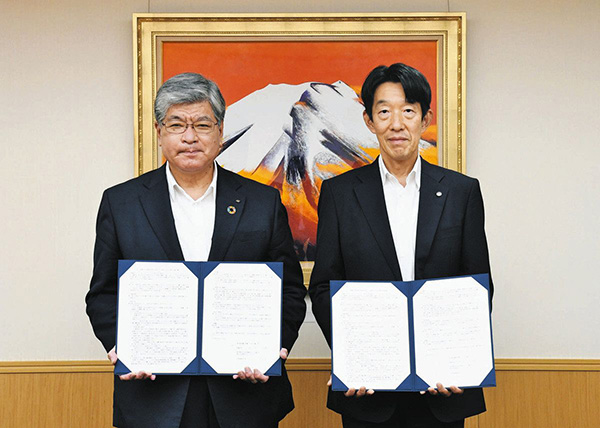
In March 2024, Tokyu Land Corporation concluded an agreement related to creative collaboration on collaborative projects with Minato Ward, Tokyo. The conclusion of this agreement, which focuses on the utilization of a corporate network with Minato Ward and collaboration with regions throughout Japan, is the first of its kind for a real estate developer.
The Group and Minato Ward have collaborated in various fields centered on “TOKYO PORTCITY TAKESHIBA” (Kaigan 1-chome, Minato, Tokyo), which is operated by the Company, including the revitalization of the surrounding area, events to promote the development of the islands region, disaster prevention, education, and local transportation.
The Company also has a wide-ranging corporate network covering various business domains and we have built strong ties with local governments throughout Japan through the Renewable Energy Business, in which we operate more than 100 projects nationwide, and other efforts. Accordingly, we have a strong affinity with the basic stance of Minato Ward, which is utilizing the strength of collaboration with companies and regions across Japan for the public administration of the ward.
Through the conclusion of this collaborative agreement, Tokyu Land Corporation and Minato Ward will cooperate to create new value for the local community by further promoting collaboration originating in TOKYO PORTCITY TAKESHIBA, while also creating collaborative projects that utilize Tokyu Land Corporation’s extensive corporate network and ties with regions across Japan.
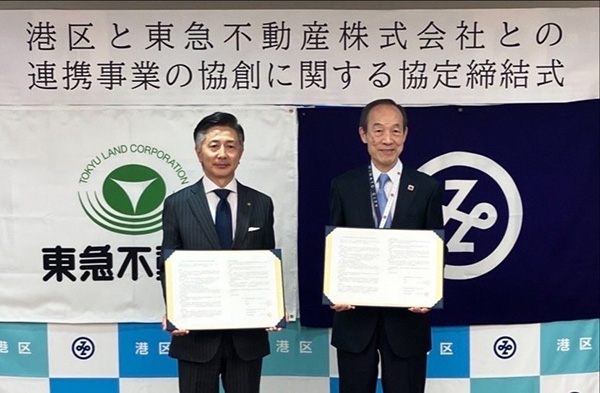
In order to solve issues in the local area, further revitalize the local area, and enhance services for residents of the ward, Tokyu Land Corporation and TOKYU LAND SC MANAGEMENT CORPORATION concluded a collaborative agreement with Tsuzuki Ward, Yokohama, which celebrated the 30th anniversary of the ward system in 2024, concerning areas such as support for raising children, international exchange and the coexistence of diverse cultures, disaster prevention and mitigation, SDGs and decarbonization promotion, solutions to local issues in the area of the town center, and revitalization of the area, centered on the commercial facility “Northport Mall” (Tsuzuki, Yokohama, Kanagawa), which is operated and managed by these companies.
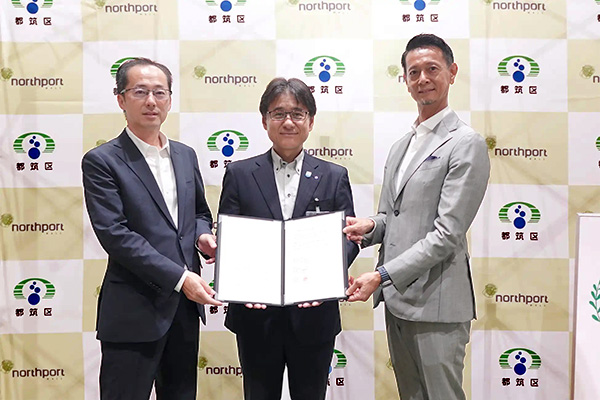
In March 2022, Tokyu Land Corporation, Tokyu Resorts & Stays Co., Ltd., Chino City, Nagano, and the Greater Suwa Area Decarbonization Innovation Association concluded a comprehensive collaborative agreement intended to contribute to carbon-neutral community planning through the creation of a sustainable, circular, and ecological decarbonized society (Regional Circular and Ecological Sphere). Chino City previously supported the establishment of “MORIGURASHI” activities promoted by Tokyu Land Corporation and Tokyu Resorts & Stays Co., Ltd. With this agreement, we aim to contribute the development of a carbon neutral community through the creation of a “Regional Circular and Ecological Sphere (sustainable, circular, and ecological decarbonized society),” by having the four parties leverage the expertise they have developed through their activities to date and their foundations in business activities rooted in local communities to strengthen mutual collaboration and cooperation.
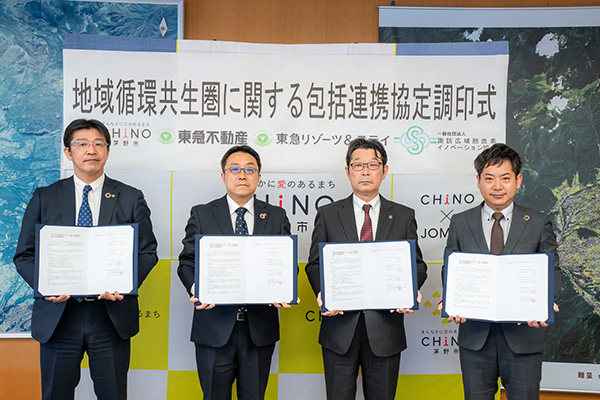
Tokyu Land Corporation has concluded a comprehensive agreement related to regional revitalization with Fujimi Town, Nagano. Under this agreement, we will promote activities based on an understanding of social issues, including further promoting the health of residents of Fujimi, and holding a joint demonstration experiment to utilize data to extend healthy lives.

In January 2024, Tokyu Land Corporation concluded a green agreement related to usage as a primary evacuation center in the event of a disaster with Ibaraki City, Osaka. Based on this agreement, part of the LOGI’Q Minami Ibaraki site will be opened to the local community as a primary evacuation center in the event of a major disaster. Furthermore, this site’s power plant has storage batteries, and a system is in place whereby, in the event of a major disaster, electric power for use by the primary evacuation center can be supplied from the rooftop power plant. Some renewable energy can also be used in the event of a blackout, meaning that this facility combines the use of renewable energy with BCP measures.
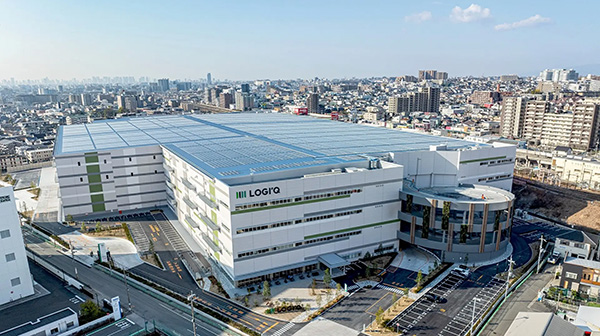
Tokyu Land Corporation and “Amagasaki Q's Mall,” a commercial facility operated and managed by TOKYU LAND SC MANAGEMENT CORPORATION, have concluded a comprehensive collaborative agreement with Amagasaki City, aimed at solving local issues, further regional revitalization, and enhancing services for local residents. A signing ceremony was held in November 2022, at “Q’s park” on the second floor of Amagasaki Q's Mall. This is the third Q’s Mall facility to conclude a collaborative agreement with a local government, after Abeno Q's Mall and Morinomiya Q's Mall Base. Q’s Mall aims to strengthen collaboration with local communities, and ensure that its facilities are loved and supported by members of those communities.
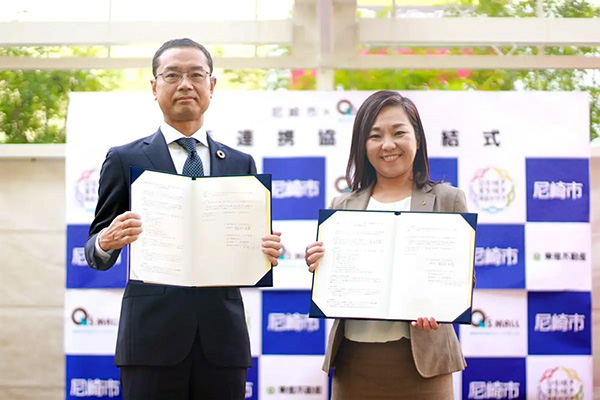
We contributes to improving the welfare of local communities, promoting international goodwill, and promoting culture and the arts through The Tokyu Foundation. In the field of culture and the arts in particular, we have honored and provided grants to 140 talented newcomers and people who are engaged in creative and outstanding artistic activities in the community.
Tokyu Land Corporation is promoting urban development projects in line with the priority strategy of producing attractive cities in its long-term management policy for fiscal 2030. In particular, large-scale redevelopment projects are contributing to the improvement of local urban infrastructure by enhancing disaster prevention functions such as furloughs in the event of disasters, improving road networks by replacing trunk roads, and improving public transportation facilities by upgrading bus stops and other facilities. In particular, we have positioned the area centering on Shibuya Station as the "Greater Shibuya Area," which is the Group's key location, and are developing and operating various commercial facilities and office buildings, in addition to redevelopment projects to enhance the circulation around the station, thereby contributing to improving the international competitiveness of the city.
Based on the concept of "future sharing," in which we share the "future" with all people, we are developing area branding to enhance the attractiveness of the city through activities such as startup co-creation, cooperation with local leaders in Shibuya, and area management. For example, we are actively participating as the secretariat of the Shibuya Ekimae Area Management Association, and are working with the public and private sectors under the theme of "Let's move Shibuya with a playful spirit. We are working to make the Shibuya area more attractive through public-private partnerships under the theme of "Let your playful spirit move Shibuya.
In Shibuya, we participate and cooperate in a wide range of community activities, such as local festivals, volunteer cleanups, and events, in an effort to enliven the town. For example, in cleanup activities, we regularly conduct volunteer cleanups before work in cooperation with various partners, including our employees, local residents, neighborhood workers, and entrepreneurs.
Supporting crime prevention for elementary school students
Tokyu Land Corporation and TOKYU LAND SC MANAGEMENT are running the "Smile Project" to revitalize the commercial facilities they operate in cooperation with the local community.
Q's Mall, whose brand slogan is "The town is generous. The people are cheerful," is collecting points from Q's Mall point card members to "use in the community to give security buzzers to local first graders!", and is making "Q's Mall original security buzzers" and donating them to first graders at elementary schools around the facility every year. The initiative began in 2018, and by 2023, 24,749 units have been donated to help children with crime prevention.
In response to the request, "We want local children to experience the wonder of sports more!", the company is implementing various projects that will lead to the revitalization of the community, such as donating "physical education equipment" to elementary schools around the facility.
 Q's Mall Original Personal Safety Alarms
Q's Mall Original Personal Safety AlarmsJunior Golf Lessons: Building healthy bodies and improving golf skills and manners in children
Tokyu Land Corporation and Tolyu Resorts & Stay Inc. are holding "Junior Golf Lessons" for elementary school students with the aim of building healthy bodies and improving golf skills and manners in children. This lesson event for elementary school students is held as a place to expand the base of junior golfers and to nurture promising golfers. (Photo shows the event held at Kawasaki International Ikuta Ryokuchi Golf Course in 2023)
 Participants gathered
Participants gathered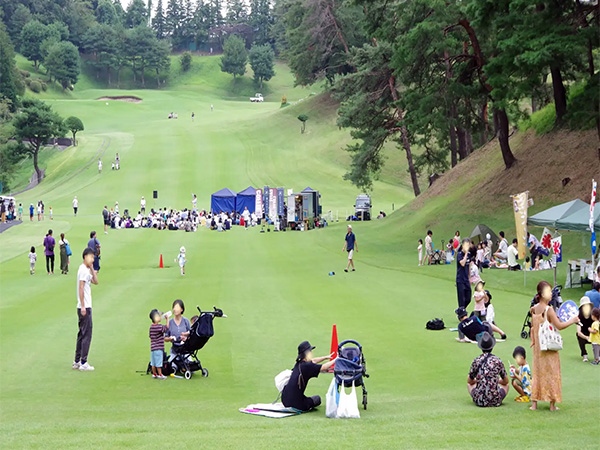 Golf lesson
Golf lessonTokyu Fudosan Holdings Corporation and Tokyu Land Corporation established two programs with total investment of 5 billion yen for financially vulnerable start-up companies.

Yonago Operation Center (Yonago City, Tottori Prefecture)
Ewel, Inc. opened a second operation center that handles administrative processing in Yonago City, Tottori Prefecture to follow the other center in Matsue City, Shimane Prefecture. The Yonago Operation Center, which opened in February 2015, plans on hiring around 300 people from the local community over the next five years, which will contribute to the creation of local employment opportunities.
 Yonago Operation Center
Yonago Operation Center Work space
Work space
Palau Pacific Resort
For nearly three decades Tokyu Land Corporation through its management of the Palau Pacific Resort has continually worked on environmental conservation, the passing down of cultural traditions, the creation of employment opportunities and development of infrastructure in Palau. More than 80% of the Palau Pacific Resort's staff is hired from Palau and Tokyu Land Corporation gives back to the local community through the creation of employment opportunities and developing human resources qualified for working in the hospitality industry.
 Palau Pacific Resort
Palau Pacific Resort
The Group has continued to provide assistance toward the recovery effort of the Great East Japan Earthquake since 2011 by utilizing its network of resources.
Tokyu Land Corporation has established a volunteer leave program that enables employees to take up to five days of leave per year in order to take part in volunteer activities in support of the reconstruction effort from the Great East Japan Earthquake. Additionally, Tokyu Land Corporation dispatches personnel around once or twice per month to attend local meetings with Kesennuma Regional Development, the developer of a planned commercial facility in the city’s port area that will serve as a symbol of Kesennuma’s reconstruction. In turn, these personnel provide advice concerning the operation, management and tenant solicitation for this facility to support its operations.
Tokyu Fudosan Holdings Corporation and Tokyu Resort Service Co., Ltd. have established an e-commerce site selling products from the Tohoku region and Kumamoto in order to support the reconstruction of these areas. One percent of the sales from this site will be donated locally through the Japanese Red Cross Society.


Tokyu Land Corporation is involved with the activities of an NPO called the Shibuya Station Area Community Planning Council, which was established in order to promote Shibuya Station area, where Tokyu Land Corporation was founded, as a place to live, work to raise the profile of the community and promote its attractiveness. As part of its support, Tokyu Land Corporation sponsors the Shibuya Music Festival, a local event organized by the Council every year, and provides direct support to the Festival with employee volunteers. In addition, Tokyu Land Corporation is a member and supports the activities of the Shibuya Sakuragaoka Community Planning Council, established with a similar goal for the nearby Shibuya and Sakuragaoka neighborhoods.
We continue to make donations for community activities, including these efforts.

In Japan, the aging of society is accelerating, with people age 65 or older accounting for more than 27% of the population. At the same time, there is a severe shortage in the supply of housing where senior citizens can continue to live comfortably with a sense of security. Moreover, partly because of the weakening of community bonds, there are many cases in which senior citizens and people who need long-term care live in isolation. The Group is applying the experience and expertise it has acquired over more than 10 years to support integrated community care and conduct initiatives to promote interaction among generations that include participation of com-munity residents. We will continue to support the lifestyles of senior citizens so that everyone in the community, not just those who live in the housing the Group provides, can enjoy their own lifestyles for all time.
SDGs in the
Senior Housing Business
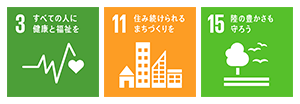
In view of social issues such as interaction among generations and changes in life stages with the extension of healthy life expectancy, the Setagaya Nakamachi Project (Setagaya-ku, Tokyo), a complex consisting of senior housing and condominiums for sale, opened in 2017 based on the concept of promoting interaction among generations and lifestyle continuity from one generation to the next. This project involves development of a community where residents can continue to live in comfort, security and health no matter what life stage they are at. The project, which takes into account the needs of Japan’s aging modern society, including the need for a sense of security from having multiple generations living nearby and realization of diverse home styles in the same community, was the fi rst to be selected in the Tokyo Metropolitan Government’s “Project to Establish Senior Housing with Services Combined with Ordinary Residences.”
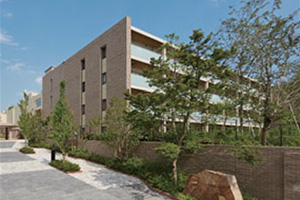 Grancreer Setagaya Nakamachi
Grancreer Setagaya Nakamachi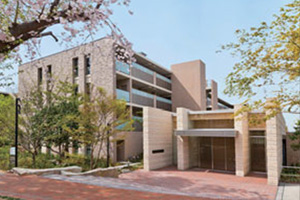 BRANZ City Setagaya Nakamachi
BRANZ City Setagaya Nakamachi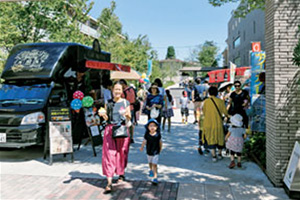 Setagaya Nakamachi Festival
Setagaya Nakamachi Festival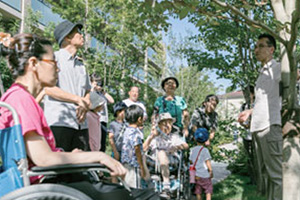 Setagaya Nakamachi Festival
Setagaya Nakamachi Festival
Model unit for L'gente Liber Shiki
In September 2015, Tokyu Livable, Inc. opened the doors to the model unit for L'gente Liber Shiki, the first in a series of renovated condominiums with the concept of "creating happiness for families raising children." This building features a unique "child raising support master plan" in which layouts provide a comfortable living environment for families raising children and considers the future of the children living there. So that both children and families alike can live in comfort and peace of mind, condominiums that adopt this master plan are thoroughly checked by accredited experts in all aspects, from individual units, common areas and management system to property location and surrounding environment, receiving accreditation as a "child-friendly housing and environment" from Mikihouse Child & Family Research and Marketing Institute Inc.
Tokyu Land Corporation has received the following certification as a condominium supporting child raising. (The figures in parentheses indicate the year and month of certification)

Sustainable Procurement Policy Tokyu Fudosan Holdings Group Sustai...
Goals, Initiatives, and Achievements Management policy Property portfol...
Supply Chain Management Critical Suppliers The buildings developed by o...
Creating a Safe and Secure Community Redevelopment project in Shibuya ...
Consideration of access via public transport during design and development ...
Disabled persons access is assessed for all buildings Tokyu Land Corpora...
Arrangement of Real Estate business value chain Supply Chain in the Real...
Request for supply chain policy on social issues In our group, individua...
Risk Assessment carried out regarding environmental and social issues for P...
Capacity building for suppliers Tokyu Re・design Corporation conducts train...
Tokyu Land Corporation conducts on-site audits of suppliers regarding safet...
Stakeholder Engagement Resolving Social Issues through dialogue with loc...
Tokyu Land Corporation aims to solve social issues through business activit...
Improvement of Services and Quality Building homes that take customers v...
Tenant satisfaction survey Tokyu Land SC Management Co., Ltd. investigates...
Communication with tenants With the aim of helping the office workers ...
Pursuit of Safety and Security in Buildings Strengthening disaster prepa...
The Group prepares a clear evacuation plans in accordance with the Fire Ser...
Condominium design that emphasizes safety and peace of mind Tokyu La...
Creating a sustainable living environment by utilizing existing resources ...
Goals, Initiatives, and Achievements Identification of salient human rig...
Target for 2030 – 100% Sustainable Wood for Concrete Formworks Much of p...
Human rights impact or risk assessments Regarding the potential new proj...
Continued positive assessment of negative impacts on human rights The Gr...
Actions implemented for avoidance, prevention and mitigation of human right...
Clear communication of human rights expectations to stakeholders The Gro...
Commitments Using our Group's business as a base, we will develop activiti...
Management Structure To address local and social issues, the Group has est...
Goals, Initiatives, and Achievements The town development in the Greater...
Increasing urban resilience and area value Urban redevelopment in the Gr...
Redevelopment project We are leveraging the Group’s abundant experience of...
Disaster countermeasures at managed facilities In addition to an expected ...
Initiatives for coexistence with local communities Coexistence with the ...
Coexistence with the local community in the Urban Development Business Off...
Coexistence with the local community in the Renewable Energy Business Sinc...
Coexistence with the local community through Tenoha In areas around Japan ...
Initiatives for exchange with local communities at stores, etc., with stron...
Conclusion of regional community planning agreements, etc. In cities acros...
Community Contribution Community investments 1. Covering defined focu...
Community Contribution Activities Creation of local employment opportuni...
Contributing to communities in the tourist haven of Palau For ...
Continuing to support disaster-stricken areas in the recovery effort ...
Supporting local activities Tokyu Land Corporation is involved with the ...
Supporting child raising through condominiums In September 2015,...
Tokyu Land Holdings conducts monthly labor management surveys at each Group...
The director responsible for promoting occupational safety management is th...
Goals, Initiatives, and Achievements Health management Tokyu Land Hol...
Health committees , Labor liaison meetings The Group has established Hea...
In all development projects in which Tokyu Land Corporation is a principal ...
The Group endeavors to offer sound workplaces that are dynamic so that each...
Number of staff trained on health and safety standards Tokyu Fudosan Hol...
Addressing Global Health Issues Currently, HIV (AIDS), tuberculosis, and...
Application to stakeholders We have concluded a construction contract wi...
The ratio of workplaces certified with OHSAS 18001: Currently, there are...
Monitoring and managing health and safety performance In order to ensure...
Status of Workplace Accidents Since FY2017, we have had no workplace acc...
Various Awards History Recognized as Outstanding Health and Productivity...
Third-party Independent Verification The Tokyu Fudosan Holdings Group re...
Management Structure In our group, to align human resources strategy, in...
Goals, Initiatives, and Achievements Launched and Participated in Builde...
External response to labor issues Participate in industry collaboration ...
When Tokyu Fudosan Holdings invests in a new project such as an M&A, it...
Whistleblower System Whistleblower System of the TFHD Group assumes it s...
Corrective and remedial initiatives Respect for human rights and mechani...
The number of incidents of labour standards non-complianceーNumber of helpli...
Initiatives for respecting human rights With the exception of a few comp...
Taking steps to promote diverse workforce regardless of race, religion, g...
The Group responds to the fact that forced labors related to the foreign te...
Tokyu Land Corporation and TOKYU LIVABLE, INC. provide an environment where...
Information Provision to Employees The 'Guidebook for Preventing Sexual Ha...
Improvement of working conditions. The Group is committed to preventing ch...
Each subsidiary of the Group monitors employees for chronic and constant pr...
In accordance with the provisions of the Part-Time and Fixed-Term Worker La...
Communication with employees Tokyu Land Corporation has instituted a lab...
Tokyu Land Corporation explains labor laws, employment regulations, labor c...
Various training programs. Employee training dedicated to skills develop...
In order to foster innovation within the Group required to create values fo...
Training on human rights policy The Group conducts human rights policy t...
The Group regularly holds e-learning and training by inviting external lect...
Various data Freedom of Association ESG Data : Labor Union-Related
Goals, Initiatives, and Achievements Promotion of Women's Participation an...
In April 2013, TOKYU LIVABLE, INC. became the first major real estate distr...
Tokyu Fudosan Holdings Group organizes Diversity Conference where represent...
Work style reform Achieving Work-life balance Our group offer diverse w...
Improvement of work engagement (Employee satisfaction survey) Tokyu Land C...
Support for balancing work, childcare and eldercare Each company in Tokyu ...
Role of elderly and workers with disabilities Employment for people with...
Employment for older workers Tokyu Livable’s “Career expert re-employmen...
Correspondence to diverse races, religions, and nationalities] Promoting...
Various training programs Education on Diversity, Equity and Inclusion ...
Various awards, rankings, etc. Recognition for LGBTQ+ Initiatives throug...
L-boshi certified* with highest ratings Tokyu Community develo...
Third-party Independent Verification The Tokyu Fudosan Holdings Group re...
To achieve GROUP VISION 2030 and our medium-term management plan, the aim o...
Human Capital Strategy To achieve GROUP VISION 2030, our vision for what w...
Strategy measures and human capital KPI One of the risks in promoting the ...